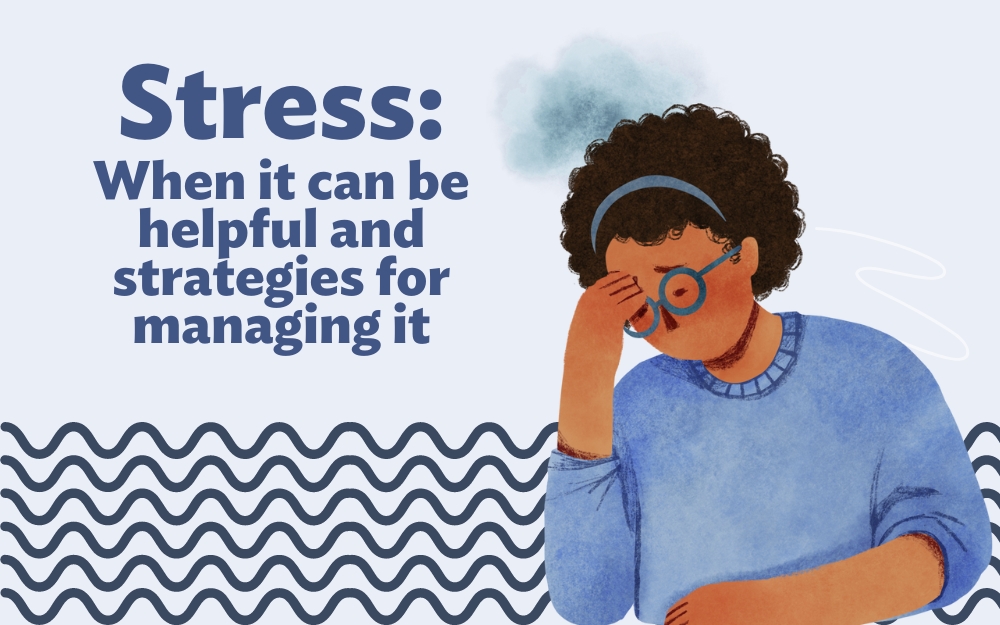By Ben Waughtal, LCPC, and Sandra Coyner, LPC, Rogers in Hinsdale
April is National Stress Awareness Month and highlights how it can negatively affect us. Knowing healthy ways to manage it can improve our overall mental and physical well-being.
What is stress?
Stress is a mental and physical reaction a person experiences when faced with a potential threat or demanding circumstance. It can increase a person’s ability to cope with or overcome a difficult situation.
What causes it?
A person can experience it in response to any number of stimuli, both negative and positive. The causes can vary and depend on how a person sees and understands pressures from outside or inside themselves.
Frequently identified stressors include:
- Work pressure
- Financial problems
- Relationship issues
- Major life changes
- Health concerns
- Daily hassles.
How does it affect someone physically?
Short-term stress is often associated with physical symptoms like headaches, fatigue, gastrointestinal issues, and muscle tension. It can also have positive effects, like increased productivity, focus, and performance.
On the other hand, long-term stress can increase a person’s risk for chronic illness and conditions, such as heart disease, high blood pressure, obesity, and susceptibility to illness. Additionally, it can worsen mental health issues, such as anxiety and depression.
Are stress and anxiety the same thing?
While stress and anxiety may feel interchangeable because one can cause the other, they are not the same. Stress is a response to an actual trigger, such as a deadline at work or trying to make ends meet financially. Anxiety is closely tied to fear, meaning it’s a response based on a perceived or potential threat.
Stress is based in the present, while anxiety looks ahead to the future. One may argue that you can feel your anxiety in the present moment. While that is true, what causes a person anxiety has something to do with an impending unknown, or speculation, about what could happen.
Is there such a thing as normal and healthy stress?
Since stress levels can vary, a person may wonder whether stress can be healthy as well as how to identify healthy stress. Good stress encourages growth.
Using the example of a work deadline, stress may challenge you to finish a project in a timely manner. You can feel stressed and still move forward because the stress level feels manageable. Unhealthy stress can often feel unmanageable and overwhelming.
Evaluating the frequency and duration of your stress can help pinpoint when it may be tipping toward distress. When stress becomes unhealthy, it can trigger unhelpful reactions and behaviors, such as avoidance. Using the same work deadline example above, avoidance may become procrastination, and you may no longer feel you have the capacity to begin working toward the deadline. As a result, anxiety often increases.
What are strategies for managing it?
Four strategies for managing it are:
- Create and implement a daily schedule to help decrease procrastination by outlining a path of accountability. Consider incorporating self-care, which often gets pushed to the side when we experience stress.
- Practice mindfulness. When focusing on the present, we’re better able to respond to stressors rather than react. All mindfulness skills begin with paying attention to one or more of the senses. When you are focused on something you see, hear, feel, taste, or smell, you must be in the present moment.
- Focus on your breath, which is always with you and always present. Every inhale is a new one; the last inhale is already in the past.
- Let go of your attachments to expectations. Expectations link us back to fear and disappointment. If your expectation is to get an A on a test, then you will be disappointed with anything less. Your judgmental voice will happily remind you that you are ‘failing.’ If you can set aside expectations and radically accept what is, you allow room for healthier voices that say, “I am enough.”
As humans, we may never get rid of stress or anxiety completely. But we can learn how to sit with those feelings in a more compassionate way. Remember that mindfulness can be what you need it to be. While some people may enjoy breathwork, others may enjoy a walking meditation. Adopting a mindset of grace and gratitude doesn’t hurt either!
Rogers offers compassionate care
Rogers’ experts in mental health and addiction treatment are ready to help if you or a loved one is struggling. Call 800-767-4411 for a free, confidential screening.


